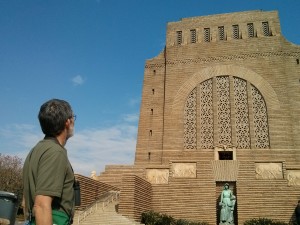Is God on our side? by Esther Epp-Tiessen
Spirited Reflection — Sunday, August 24, 2014
Esther Epp-Tiessen is the Ottawa Office Public Engagement Coordinator for the Mennonite Central Committee Canada
If it had not been the LORD who was on our side – let Israel now say –
if it had not been the LORD who was on our side,
when our enemies attacked us,
then they would have swallowed us up alive,
when their anger was kindled against us… — Psalm 124:1-3

Photo by Esther Epp-Tiessen of the Vortrekker Monument in Pretoria, South Africa with husband Dan Epp-Tiessen in fhe foreground
On a recent trip to South Africa, my husband Dan and I visited the Vortrekker Monument in Pretoria. The massive granite structure – 40 meters tall – towers mightily over the city. It was built in the 1940s to commemorate the 1838 victory of Boer pioneers over Zulu warriors in the “Battle of Blood River.”
In the 1830s, large groups of Boer (later known as Afrikaner) farmers moved out of Cape Colony in the western portion of southern Africa and into Zulu territory in the east. The organized exodus of these farmer-settlers became known as The Great Trek and the participants as “Vortrekker.” An initial encounter between the Vortrekker and Zulu king Dingane resulted in the death of the Boer leader and the massacre of several hundred Boer men, women and children.
In response to the massacre, the Boers lured the Zulu into a battle they felt they could win. Prior to the battle, they made a vow that if God would “protect us and give our enemy into our hand,” they would observe a Sabbath annually to commemorate the event. On December 16, 1838, some 460 Vortrekker, with musket rifles and cannons, fought off thousands of Zulu warriors, killing about 3,000. Only three Boers sustained injuries.
The Boer people interpreted their amazing victory as a sure sign that God was on their side. The Vortrekker Monument, built a hundred years later, features a plaque inscribed with the 1838 vow: “For the honour of His Name will be glorified by giving Him the fame and honour for the victory.”
In Psalm 124 the psalmist thanks God for deliverance from enemies and attributes the victory to God: “If it had not been the LORD who was on our side…, when our enemies attacked us, then they would have swallowed us up alive, when their anger was kindled against us…” (verses 1-3). Similar sentiments are found in other Psalms and in the historical writings of the Bible.
Ancient Israelite faith reflects contrasting understandings of God. On the one hand, the Israelites saw Yahweh as the Creator of the universe, the One who fashions and cares for all life – including all peoples. On the other hand, they also frequently envisioned Yahweh as their tribal deity who chose, saved, and protected them, often at the expense of their enemies.
In the belief that Yahweh was on “their side,” the ancient Israelites were not unlike their neighbours. Most peoples in the ancient Near East worshipped tribal deities who supposedly cared primarily about their welfare. It is remarkable how Israel’s prophets and Jesus strengthened the understanding among the Israelites that God’s love and compassion embrace all people, including enemies.
In South Africa, the Afrikaner people eventually built a theology and ideology of Apartheid on the foundation that God was on their side. But they are certainly not the only ones who, like the ancient Israelites, have held this belief. Through the ages, the Christian church has sanctioned the conquest and colonization of indigenous people because it believed God was on its side. During World Wars I and II, Allied commanders and clergy invoked the idea that God was on their side, blessing their war-making. For that matter, Adolf Hitler did the same. More recently, President George W. Bush claimed God was on his side when he likened the war on terror to a religious crusade and the U.S. as God’s instrument of good to destroy evil.
There is deep and profound truth to the claim that God is on our side, and this is one reason the conviction is so compelling. But it matters how we understand this truth. God is on our side, in the sense that God is with us, especially in times of great suffering. But God is also on the side of all people. The idea that God is on our side – and our side alone – can be very dangerous. Over the centuries, it has served to legitimize conquest, slavery, dispossession and war. It has provided religious license for people of faith to kill others.
Those of us committed to “decolonizing” our faith do well to read Psalm 124 – and other scripture texts like it – with care and suspicion. We do well to remember that God is not a tribal deity sanctioning brutality by some against others, but the One who holds all creation in a holy embrace.



